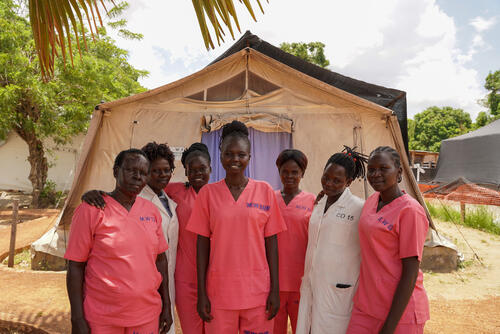Myanmar Earthquake, Devastation at Inlay Lake: Update from Irish Deputy Head of Mission, John Canty
28 April 2025
On 28 March 2025, a powerful 7.7 magnitude earthquake struck central Myanmar, devastating the regions of Mandalay, Naypyidaw, Sagaing, and Shan State. The earthquake struck a country already gripped by several health crisis and conflict, compounding the challenges faced by affected communities. Limited resources, staff and supplies have left some facilities over-burdened and struggling to respond to the growing health needs.
MSF’s John Canty reports from Nyangu, near Inlay Lake, on the devastating impact of the recent earthquake:
"Good morning. This is John Canty from Nyangu. Just by Inlay Lake here. I'm at the jetty at the moment."
John explains the vulnerability of the communities living directly on the lake:
"The community here that live on Inlay Lake was particularly badly affected by the earthquake on the 28th of March. While the land here and many of the buildings on land are relatively intact, they're quite well intact. On the lake itself, you have this floating village they call it, where they've lived for thousands of years, fishermen, farmers, and the houses they have are built on stilts just sitting above the lake where they have farms as well, and they grow tomatoes and various other vegetables on top of the lake. It's quite a unique agricultural system."
The earthquake severely damaged these delicate structures:
"As a result of the earthquake, many of the stilts underneath the houses cracked. The houses themselves collapsed into the lake. There were approximately about 53 that were killed or that died as a result of either drowning or the impact of the overall impact of the earthquake."
John describes the dire conditions the displaced communities are now facing:
"Right now, what we see is that communities living on the lake are in a precarious situation. They're accumulating on these kinds of man-made islands. They're gathering under floating gardens. They're gathering on anything that will float, sheets of bamboo or plywood. They're exposed to the hot weather during the day and cold weather at night. It's been raining quite a lot this week as well."
The scale of the destruction is immense:
"In some of the villages that live on the lake, there's about 4,400 households. In some of these villages, up to 90% of houses have been completely destroyed, as in lying in the lake."
In response, MSF teams are providing critical support:
"As they continue to rebuild, MSF has been providing NFI distributions, non-food items. We have experience of operating in these situations. So practical items like buckets and jerry cans, aquatabs for cleaning the water, mosquito nets, malaria particularly prevalent around this area. We've got hygiene kits with toothpaste, soap, brushes. Menstruation packs."
"We had a team on the ground the day after the earthquake, and they have started distributing those immediately."
Access remains a major challenge:
"It is difficult to access; there are these small boats. Let me show you these narrow little boats. The lake isn't particularly deep, but at the bottom of it, it's very muddy. So when the houses collapsed, all of their items ended up inside the lake, and they find it very difficult to access it."
Clean water supply is another urgent need:
"As well as the NFI distributions, we're also looking to provide an increase in access to clean drinking water. There have been quite a number of private donors providing drinking water in bottles, but I think that'll go soon. If people don't have water, they're going to consume unsafe drinking water, which is the lake, and many of the latrines in the houses have also been destroyed. It's not clean."
MSF is also deploying mobile clinics:
"We're also establishing mobile clinics in the gathering points or in areas where we can. With a doctor, some nurses, a midwife."
John shares his experience on the ground:
"I've been here now myself for one week, and prior to that, I was in Mandalay, the second biggest city in the country, and a couple of very badly affected communities around Mandalay and in Seag. Again, MSF is providing support through NFI distributions, shelter support with bamboo, giving communities the necessary means to re-establish, rebuild their houses, or even a temporary shelter, and also running mobile clinics again with doctors, nurses, and midwives to try to bring healthcare closer to those communities."
Finally, John expresses his gratitude:
"Just want to say a big thank you to all of the supporters back in Ireland and various other countries. Thank you very much."
Help us provide vital medical care to those who need it most.

